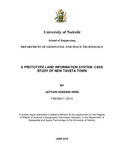A prototype land information system: case study of new Taveta town
Abstract
A land information system (LIS) is a computer based information system that enables the
input, management, analysis, output and dissemination of spatially referenced, land
parcel based data and information at mainly large (mapping) scales. This technology,
which has matured in the developed countries, has been proven to be an invaluable tool
for better land administration. The use of the technology is catching up in the developing
countries Kenya included.
The project aims to demonstrate how a computerized land information system supports
operations such as search on land, land transfer, land taxation, land use planning and land
valuation. The main objective of the project is to develop a Land Information System by
developing a geo-database that incorporates both spatial and non-spatial attributes of land
parcels in the New Taveta Town.
The methodological approach applied in this study included; data collection and capture,
data processing and verification, building a GIS database, joining of the spatial data to the
GIS database, output of the results, analysis of the results and finally conclusions and
recommendations..
The results of the study include search reports on different plots such as tax reports,
ownership reports, property user reports, transfer reports among others; and query results
by different users of the system such as investors, financial institutions, surveyors,
planners among others. The Land Information System is easy to update, secure and
facilitates quick retrieval of information. The security employed on the system include
physical security, administrative controls and systems security.
The conclusions drawn from the results and analysis of the study was that the
computerized land records are easy to update, process, analyze and retrieve and it will be
useful for the County Government to set up such a system. The recommendations drawn
from the research include design of a program to link the Local Authority Information
and Financial Management System to the New Taveta Town LIS so that information on
taxation can be updated in real time as payments are being made, security of the database
to be enhanced through combination of security measures from 4 layers of security
control namely hardware/software/ data security systems, physical security,
administrative controls and laws relating to security and privacy.
Publisher
University of Nairobi

